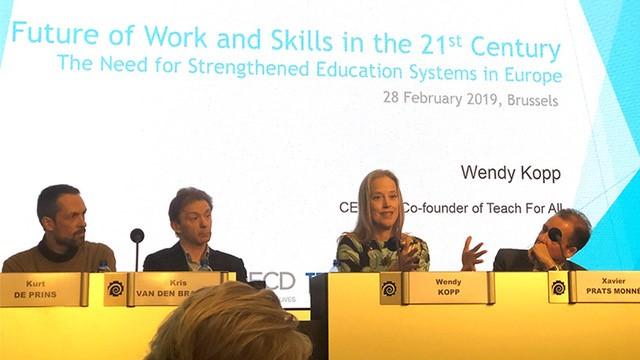OECD and Teach For All Event Highlights Importance of Collaborative Leadership

On February 28, Teach For All and the Organisation for Economic Co-operation and Development (OECD) facilitated a conference on the “Future of Work and Skills in the 21st Century: The Need to Strengthen Education Systems in Europe,” which was hosted by Teach For Belgium. More than 100 guests, including officials of European Union institutions, European education stakeholders, and non-governmental organization representatives, gathered to learn from education and employment experts about innovative ideas for achieving systemic change to ensure all youth have the opportunity to realize their potential in the future European society and economy.
The conference began with a presentation by Andreas Schleicher, Director for Education and Skills, Special Advisor on Education Policy to the Secretary-General at the OECD, in which he highlighted what can be learned from high-performing and rapidly improving education systems around the world. The presentation was followed by a panel, moderated by Xavier Prats-Monné, Special Advisor to Teach For All, which included Filip Van Depoele, Deputy Head of Unit at the European Commission’s Directorate-General for Education, Youth, Sport and Culture; Wendy Kopp, CEO and Co-founder of Teach For All; Kris Van Den Branden, teacher educator at the Katholieke Universiteit Leuven; Dag De Baere, a Teach For Belgium fellow; and Kurt De Prins, principal of the Imelda-Instituut, one of the schools in Brussels where Teach For Belgium fellows are placed.
Speakers discussed the need to invest in quality education for all children, in order to build the adaptive skills, mindsets, and leadership needed to meet the changing demands of an increasingly interconnected and digital world. The panel also noted that high-performing systems and leadership programs in the education sector point to promising learnings and insights into what’s possible. A recurring theme throughout the conference was the need to deepen collaboration among the education community, especially teachers, to scale innovation and achieve change.
In his opening presentation, Andreas Schleicher argued that in a world of an abundance of information, the way students are currently taught is losing relevance and purpose. Technology can be used for conveying information that is easy to teach and test, he suggested, creating space for teachers to be more innovative and focus on building students’ socioemotional skills and societal and global values. He warned, however, that while digitization and globalization have been empowering for those with the right skills and knowledge, for those who are insufficiently prepared these evolutions will widen the gap between the more and less advantaged. To address socioeconomic disadvantage, he offered as an example the Teach For All network’s approach of developing promising individuals to teach in challenging educational contexts.
In his remarks, Van Depoele noted that recently the EU developed a plan to equip young people with a broader set of skills, seen as a fundamental building block for the future work, and to improve education systems across the EU. He also explained that over the past 30 years, EU Member States have evolved from viewing education as a purely national matter to a shared understanding that countries facing similar challenges can learn from one another. Today, Member States see the value of the European Commission’s Erasmus+ program—a funding scheme that supports activities in the fields of education, training, youth, and sport to increase young Europeans’ future opportunities, which allows cross-border exchanges and collaboration.
Wendy Kopp urged education stakeholders to step outside the box and ask themselves what they want to be true for local children in the future. There is a need to reorient educations systems and to understand local contexts, she explained, in order to work towards a broader set of outcomes for our children. She described how Teach For All network partners in 49 countries are recruiting promising future leaders to channel their energy into disadvantaged schools and addressing diverse students’ needs—an experience that builds the foundations for the kind of leadership needed across sectors to achieve sustainable change. She also stressed the importance of collaboration in a global society. "Locally rooted leaders will move more quickly,” she noted, highlighting one of Teach For All’s key learnings, ”if they’re learning from each other across borders.”
Kris Van Den Branden shared that in the Flemish Region of Belgium 22% of teachers leave the profession within the first five years because of unfavourable working conditions and lack of support in teaching a very diverse population. “We need to start teaching teachers as leaders,” he said, explaining that teachers need time and tools to develop professional expertise throughout their careers and through teacher collaboration.
Reflecting on his own teaching experience, Dag De Baere echoed the value of peer networks. “Peer observation has the biggest impact on professional development, but it’s one of the most underused resources,” he said. “We share the future of education; so let’s all share the responsibility of setting up our teachers to achieve high standards… it takes shared leadership, shared responsibility, shared innovation.”



